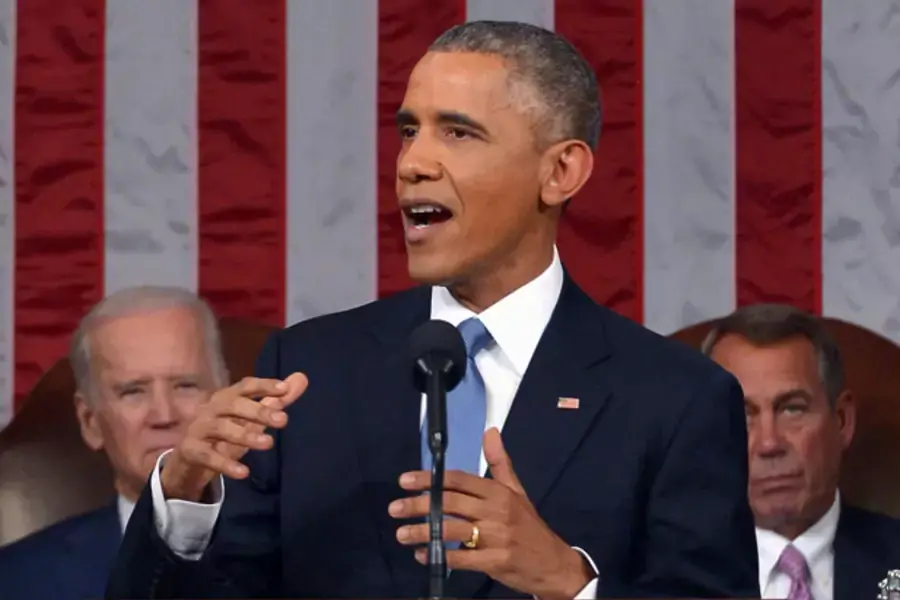Obama's Speech: The Conundrum on Trade

More on:
President Obama urged Congress last night in his State of the Union address to “give me trade promotion authority” to complete “strong new trade deals from Asia to Europe.” If Congress agrees – and it probably will – it will be the first time in his administration that the president has had the authority to move forward on trade. The potential results – a Trans-Pacific Partnership (TPP) with Japan and 10 other countries, and a new Transatlantic Trade and Investment Partnership (TTIP) with Europe – would be the farthest-reaching trade agreements in a generation.
It was a courageous moment for the president, pitting him directly against his own Democratic Party, which over the years has grown more and more hostile to additional trade opening. Oregon Democrat Peter DeFazio said that the president’s push for the agreements was “No. 1, No. 2, No. 3 and No. 4” on the list of things Democrats did not like about the president’s speech.
The speech captured more clearly than anything I have heard before the conundrum on trade. The story is a fairly simple one. Over the past 40 years, Americans have been working in a far more competitive global economy, one in which many of them – especially in the once higher-wage manufacturing jobs – are competing directly with increasingly skilled workers from across the globe. The only way to succeed in that competition, as the president said last night, is to make sure that Americans are more educated, more able to join the workforce, and better equipped with the latest technology and infrastructure than our competitors. The goal, as he said, is to build “the most competitive economy anywhere, the place where businesses want to locate and hire.” Armed in that way, Americans should readily embrace trade opening because it simply provides more opportunities and more customers, while allowing us to benefit from the best products made anywhere in the world.
But the real source of the skepticism on trade is that United States has left far too many of its people unprepared for the rigors of that competition. Our lead in education has vanished, our infrastructure is crumbling, and we do far less than other advanced countries to retrain the unemployed and prepare them for better jobs and careers. As a result, far too many Americans are simply left behind, condemned to lives of marginal employment and low-wage work. Yet even President Obama’s more modest proposals to address these issues – two years of free community college, paid sick leave for all workers, a minimum wage boost that simply restores it to past levels – are derided as partisan schemes that have no chance of passing the new Republican-controlled Congress.
Trade does have a chance of passing, and should. The stakes are high. The United States needs to be deeply engaged in Asia in particular to help build an economic future for the region that is not dominated solely by China, and to make sure the United States has the most open access possible to the fastest-growing consumer markets in the world. President Obama, after many years of hedging on trade, has now clearly made that commitment. The White House has set up a whip operation to build support on the Hill, and the president has signaled that he is willing to work closely with Republicans to muster the votes he needs.
But there will be minimal support from Democrats. Most of the Democratic opponents are not protectionists wanting to run way from competition. Instead, they see a game being played in which too many Americans have little chance of winning. While highly educated Americans have been enormously successful in the more open global economy, building some of the world’s most innovative and dynamic companies, far too many are simply unprepared for that competition. They are like over-matched boxers who keep getting knocked down, only to be told by their corner that they just have to get back in the ring and keep taking the punches. It would make more sense to pull them out of the ring for a year of training and conditioning before sending them back again.
If even some of the proposals that President Obama urged last night were enacted by Congress, it would be far easier to expand support for trade liberalization. An American workforce that was better prepared for the rigors of competition would be far more enthusiastic about taking on new competitors. But until the United States addresses more of its competitive challenges head on – and that means in part new initiatives from the government in Washington -- support for trade will continue to be far weaker than it should be.
More on:
 Online Store
Online Store
